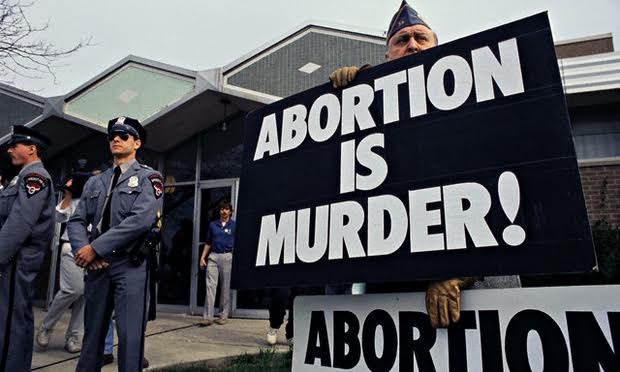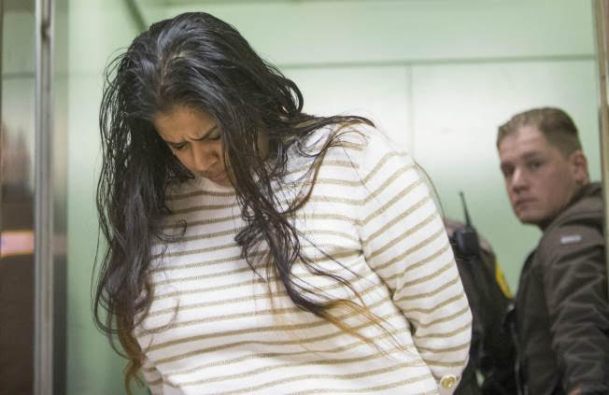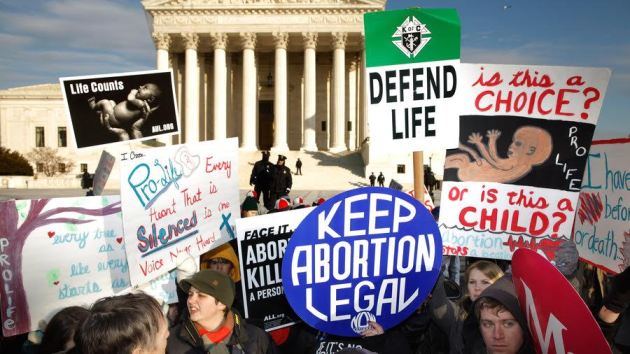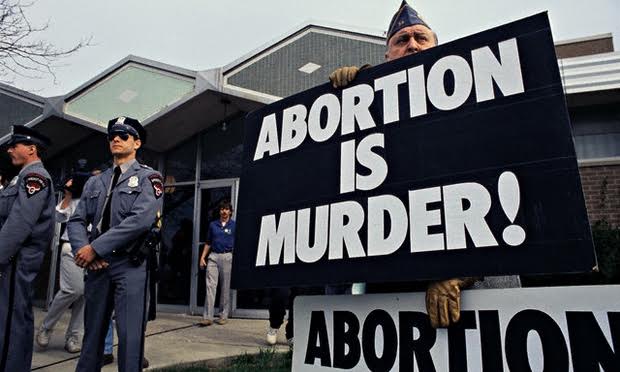A Matter of Life vs. Death
How the Anti-Choice Movement Uses Death-phobia to Argue they Have Life on Their Side
Outside of almost every abortion clinic in the nation are people shouting about death. Anti-choice advocates believe, and preach that having an abortion is murder. Anti-choice websites compare the work Planned Parenthood does to the Holocaust, and disseminate doctored images of mangled fetuses, as if to confront you with the “death” that is abortion. But is death-phobia — not death itself — that is the anti-choice movement’s strongest weapon, misogyny and religious zealotry aside.
Death-phobia pervades many a political and social movement, but few have perfected the manipulation of it quite as adeptly as the “pro-life movement.” Even the name they call themselves is a masterful maneuver, centering their image, not on the issue of abortion itself, but on the life, death dichotomy. Their rhetoric invokes death at almost every turn. Aside from the most blatant messaging which explicitly likens abortion to murder, they also invoke death-phobia in the way they legislate abortion. Any law that implies there is a life at stake, without centering that discussion on the life of the mother is quietly implying that because the fetus is a life, that abortion must be death. They use this logic to support laws like parental involvement laws and informed consent laws that presuppose abortion is a traumatic, and unnatural procedure from which a woman will emerge broken, for fighting against her “God given role.”
That idea, that abortion runs contra to the divinely deemed purpose of a woman, is strongly tied to the fear of death. The anti-choice movement has long been filled with patriarchal Christian notions about motherhood and purity that designate a woman’s natural role is to be a caretaker; to be a mother. This is of course all coupled with patriarchal attitudes about the second-rate humanity of women, and their lack of capacity to make decisions, which literally puts the life of a fetus, above the life of a human being. The same way women are made out to be caretakers and not leaders in the death industry, and in death practices — working behind the scenes at a funeral home, instead of running the place, or caring for an ailing parent or relative while her male siblings or family members take a back seat — the caretaker role is forced on women as they make choices about their reproductive health.
It stands then, that there could be no more sacrilegious, unnatural role than for a mother to have a hand in the “death” of her child. By invoking the incendiary image of a mother going so far as to kill her child, the anti-choice movement makes very clear how they want you to think about this issue: as strictly a matter of life vs. death. They also use this idea of divine motherhood to promulgate misinformation about things like “abortion regret” on their websites, to their lawmakers, and at “crisis pregnancy centers,” which are essentially phony abortion clinics where people are fed unscientific anti-choice information about abortion. They reason that women experience mental health issues following an abortion, like anxiety or PTSD, because by having an abortion they are not being true to their fated roles; they are disobeying the natural role god has created for them.

But as scientifically minded people, inclined more towards empirical data that biased anecdotal theories based in non-secular beliefs, we know all the above things to be untrue. We know that abortion is not murder. We know that women are statistically more certain about their decision to have an abortion than they are to have knee surgery. Study after study has proven that there are no corollary adverse mental health effects following an abortion. We know that the incidence of mental health issues following an abortion is comparable to that of pregnancy, and that one of the causes of mental health issues surrounding an abortion results from the stigma anti-choice activists perpetuate.
The intersection of death-phobia and reproductive rights does not start and end with the modern anti-choice movement, though. And it extends beyond the issue of women’s rights to race relations. To understand the full context of the role death-phobia plays on these issues, you must also look to the history of the state controlling women’s bodies and reproductive health in other ways. On the cusp of reproductive health advances, fertility and childbearing was practically forced on white women, especially of higher class. Meanwhile, throughout the 20th century, federally funded sterilization programs existed in 32 states as part of the eugenics movement with women of color and immigrants among those subjected to forced sterilization. In the 1900’s in fact, California led the country in the number of sterilizations performed. When all was said and done, the state had performed over 20,000 sterilizations on men and women. Along with pure, unadulterated racism and bigotry, the overarching societal incentive behind these two movements was fueled with the fear that without white women procreating, and with too many women of color or immigrants procreating, the white race would die out — a racist sentiment, in and of itself.
And while that may be where death-phobia planted its roots into reproductive health politics, their relationship is still alive, and kicking. One of the most recent, and perverse iterations of this combo are laws being pushed that require women to have funerals for their miscarriages and abortions. Because really, nothing says “abortion means the death of your child,” like requiring funeral services for them. Aside from this putting a financial strain on the person have the abortion, these laws are grotesque for a number of reasons. Similar to laws that require abortion providers to have admitting privileges at area hospitals, these laws will force abortion clinics in some situations to contract out with funeral homes. And also like the admitting privileges law, this will likely prove problematic as some funeral homes, like some hospitals will object to affiliation with abortion clinics for religious or political reasons.
The most obvious relationship between death phobia and these laws is of course, is that they force people to have abortions to engage with death in an explicit way. Some may well feel like their abortion is something to grieve for, but many do not. For many people having an abortion means living the life they want; it means avoiding financial and emotional strife, and maintaining autonomy in their choices. These laws force everyone who has an abortion, no matter what the relationship with their decision to abort may be, to confront that decision like a death. They do this, full well knowing that confronting death, and the rituals that go with it – dealing with funeral homes, having a service – are trying and emotionally fraught occasions. Perhaps they try to enforce these laws thinking people will be so averse to having a funeral that they will reconsider their abortion, or perhaps they want to enforce them so the people who do decide to have an abortion will be forced to confront that choice as if it were a death as a punishment. It’s likely a little of both. But whatever backwards logic is used to justify these laws, they unquestionably manipulate people’s death-phobia to make a point about abortion, and to punish those who chose it.
And while some of these laws are being struck down in the courts, or voted down in the legislature, it’s important to note that one of the most prominent attempts to effectuate one of these laws was carried out by none other than our VP-to-be, Mike Pence. Earlier this year, Mike Pence, who believes you can electroshock therapy the gay away, and enabled starting an HIV outbreak in his states by defunding Planned Parenthood, signed one of the most restrictive abortion bans in the country into law. In addition to banning abortion if a child has disability, or on the basis of race or gender, the law required that women either bury or cremate aborted fetuses. In a statement about the bill, Pence said “By enacting this legislation, we take an important step in protecting the unborn, while still providing an exception for the life of the mother…I sign this legislation with a prayer that God would continue to bless these precious children, mothers, and families.” Without directly mentioning death, by describing an abortion restriction as protecting the unborn, he builds on the implication that to have an abortion is to bring harm to a child; that it is a form of death.
Mike Pence also supported a measure requiring the state health department to disseminate brochures about “perinatal hospice care,” which he called comprehensive pro-life measure that affirms the value of all human life.” Hospice care, is of course, end of life care, and it efforts to mandate the inclusion of discussing perinatal hospice care are another attempt to insert death rhetoric into abortion politics as a way to stigmatize choice. Perinatal hospice is a hospice program for women with unviable pregnancies. It is offered in an an effort to sway people away from abortion by giving them the “choice” to receive counseling while they carry, and eventually deliver an unviable pregnancy. And in a few states doctors are required by law to offer it as an alternative to abortion.
Some people may indeed consider terminating even an unviable pregnancy an impossible decision. But it is not their well-being being prioritized here. Laws mandating doctors inform their patients about perinatal hospice — which have been opposed by the American College of Obstetrics and Gynecologists — are nothing more than another transparent attempt by anti-choice lawmakers to insert death into the abortion decision. By requiring women to hear information about a program most commonly used to make people comfortable before their death, these laws force people to see their decision to have an abortion as, at the very least, death-adjacent.

In what is perhaps the most blatant insertion of death-phobia into abortion politics, some prosecutors have tried to bring charges against women who, out of desperation, induce their own miscarriage. In Indianna, Purvi Patel was facing 30 years in prison for child neglect, and feticide charges that were filed after she allegedly ordered and used an illegal abortifacient, before her conviction was overturned by the Indiana Court of Appeals. After allegedly inducing her abortion at home, Patel went to the emergency room, where she said she had had a miscarriage. The attending physician, however suspected that she had attempted to induce an abortion, and called the police. It’s worth noting, as well, that this doctor is a for the American Association of Pro-Life Obstetrics and Gynecologists.
In Tennessee, Anna Yocca faced charges for aggravated assault and attempted murder, for using a coat hanger to induce an abortion at home. When she started to bleed, she panicked, and her boyfriend took her to a nearby hospital where she later gave birth to a 1.5 pound baby boy. A grand jury just added three more felony charges to her indictment: aggravated assault with a weapon, attempted procurement of a miscarriage, and attempted criminal abortion.
When Chris Matthews asked then presidential candidate Donald Trump what would happen to women who have abortions if he made abortion illegal, Trump said there would have to be some form of “punishment.” But the truth of the matter is, people all over the country are being punished for having abortions already. They’re being punished by everything from TRAP laws to things like actually being punished, by law, for inducing an abortion. Why charging a woman who induces her abortion with murder co-opts death phobia needs little extrapolation. But any law that punishes people for having an abortion or attempting one on their own out of desperation, is inching its way closer to making legal abortion akin to murder, and working to make people see abortion as something inherently tragic, like death.
The Trump/Pence campaign was fraught with imagery of death that fed directly into the death phobia of the most racist and bigoted corners of society. As Caitlin Doughty pointed out in one of her latest videos, the Trump campaign inserted death and murder into almost all their messaging — citing the death that would befall us at the hands of terrorists and immigrants, and the violence in the “inner city” as reasons to vote for him, the “law and order” president. But as Caitlin also pointed out, these were mostly bigoted maneuvers, used to exploit an already death-phobic society’s racism and hatred for people of color. Unfortunately, it was also an effective maneuver.
Meanwhile if the issue of death is relevant in any part of the abortion discussion, it is within countries, and parts of the US where abortion is illegal, not where it is readily available. The maternal mortality rates in parts of the world where abortion is illegal are gutting. According to the World Health Organization over 21 million women experience an unsafe abortion every year. Deaths from unsafe abortions make up almost 15% of all maternal deaths, and almost 50,000 women every year die from an unsafe abortion. And while 99% of maternal deaths occur in developing countries, in the US, maternal mortality rates vary severely depending on race. Black women die in childbirth at a rate four times higher than white women. In addition to racial discrimination and “unconscious racial bias among doctors” one reason for this is that black women face seriously diminished access to reproductive healthcare. If the “pro-life” movement really cared so much about the wellbeing of women they would spend less time pushing and supporting polices that are literally killing them.

The death positive movement shares motives and end goals with many social justice movements, including the pro-choice movement, and that is why it must be such a strong voice in the years to come. The death-positive movement is spearheaded by a group of diverse individuals and its message and efforts are truly intersectional. Being pro-choice and being death positive are about being able to chose how you live, and die, respectively, with dignity and autonomy, and ensuring that these rights are extended to the most marginalized people in our society. The pro-choice movement, like the death positive movement purports that autonomy and choice in those decisions should not, and cannot be dictated by someone’s financial situation. The pro-choice and the death positive movement are about bucking a legislative system run by lobbyists and pseudo-scientist who push their own unrealistic ideologies about an issue on others, without an logic or empirical evidence to support their efforts. Most importantly the death positive movement, and the pro-choice movement are about being able to confront life’s challenges with knowledge, confidence, and support, and without fear.
In the coming years it is going to be up to those of us who believe in these universal principles, like choice, autonomy, and science, to stand our ground. And it is important that movements that share these principles, like the pro-choice movement, and the death positive movement, work together in ensuring the protection of society’s most marginalized people.

Leave a comment